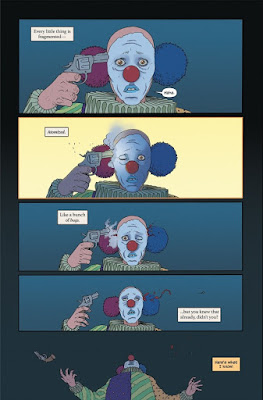I will be upfront and honest here: I’ve been mostly underwhelmed by this miniseries that featured creative scribe of the critically acclaimed ongoing title
Ice Cream Man. But let me go one step further ..that underwhelming feeling I’m admitting to is driven only by the high expectations that preceded it. By no means is it a bad miniseries encapsulating the human emotion of persistent sadness. Hell, if it were to have been published at any other time other than alongside its sister book,
Ice Cream Man, it would have been hailed a masterful take on human behavior and how sadness is the most provocative human emotion. That wasn’t the case. But the book still does what it would have done in any other timeline, and it does it well. I just forgot to stop comparing it to ..you know ..that other one.
Beginning things in the closing chapter of
Haha in issue six, we are introduced in what has become recognized as classic W. Maxwell Prince narrative by presenting story by way of a sad tone told in first person in a hyper-depressive tone.
Haha has been a brilliant path used to ratchet up tension between fiction and non-fiction that has been done for so long in
Ice Cream Man. Sadness as a story trope is one thing, but mix in a degree of relatability and the reader is in for one hell of an uncomfortable good time.
When things began in
Haha they get uncomfortable real quick. Vanesa del Rey set the bar high as she painted the pictures to Maxwell’s story of a sad suburbanite clown just trying to make ends meet. It’s told in such a bleak manner that you forget you’re ready something for fun, but rather you get sucked into this universe being created right before your eyes.
Moving forward to issues two and three we have Zoe Thorogood and Roger Langridge, respectively, taking the pen and ink. Zoe takes on Maxwell’s origin story for a pole dancer, while Roger flawlessly brings to life a near silent issue about a pantomime. Halfway through the miniseries anthology at just three issues and we haven’t had a single issue that resembled another. Each held a unique tone, one that served specific purpose to the story.
On the latter half of the series Patrick Horvath and Gabriel Hernández Walta combine for a sequential pair of complementary but opposite vantage points of sadness. Horvath’s existential array of watercolor creates an atmospheric blanket of dread that only he could bring to life. Walta then uses his unique style to capture the rough edges around a disgruntled spooky old clown lady. It isn’t until we finally come to
Haha’s concluding issue where we are reminded of the perfection that is Martin Morazzo illustrating W. Maxwell Prince’s stories of pensive sadness.
The final issue, out this week, begins with a paneled page that is not for the faint of heart. I am serious when I say that reading this comic (though as highly as it comes by my recommended) you should do so with a bit of caution. Prince refuses to shy away from telling vaguely reminiscent stories of our reality and transforms them into a nearly supernatural experience as you turn the pages. He tends to incorporate our most troublesome and notoriously persistent human emotion of sadness into a relatively awkward and uncomfortable if not incredibly entertaining story.
Martin Morazzo has been drawing for W. Maxwell Prince throughout the life of the other existentially melancholic story of individuals’ missteps in life (
Ice Cream Man), and it hasn’t been until now that he has joined him on the nearly unnoticed miniseries,
Haha. With no intentional remark of inferiority, I find Morazzo’s ability to capture emptiness and soul-deep sadness in the life that is brought through his illustration damn near perfection. This by no means suggests that the illustrators of the first five issues of
Haha failed to succeed in doing the same. But what I am saying is that Maxwell and Morazzo have gotten in stride with one another so well that no one else is quite able to fit as nicely in the synchronized creative space they have honed in for themselves.
In conclusion, this was the long-winded version of me telling you all that
Haha #6 is out this week as the series’ final issue, and everyone reading this (and even those of you that haven’t yet) should go out, pick up a copy and read it. Sure, it’s not nearly as funny as the title makes it sound. And actually it’s quite literally the opposite. But for better or worse, W. Maxwell Prince can write the hell out of a Martin Morazzo illustrated melancholy horror.
Haha #6 by W. Maxwell Prince, Martin Morazzo & Chris O’Halloran and published by Image Comics














